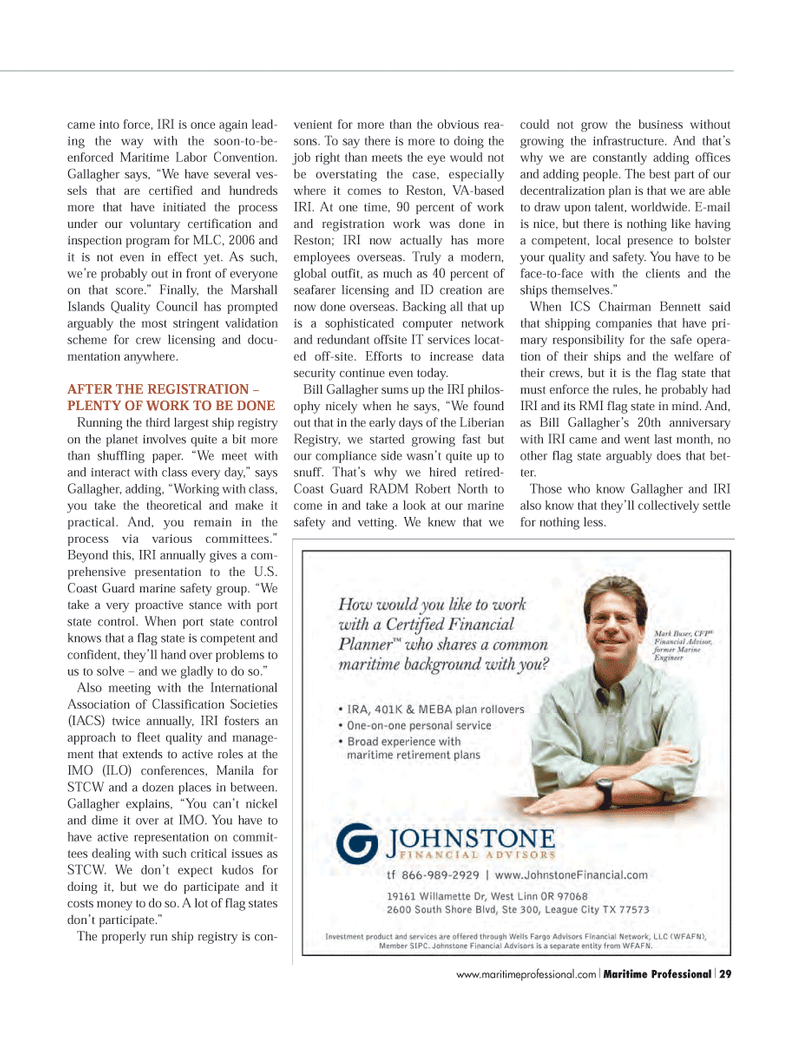
Page 29: of Maritime Logistics Professional Magazine (Q4 2011)
Classification
Read this page in Pdf, Flash or Html5 edition of Q4 2011 Maritime Logistics Professional Magazine
www.maritimeprofessional.com Maritime Professional 29 came into force, IRI is once again lead-ing the way with the soon-to-be- enforced Maritime Labor Convention. Gallagher says, ?We have several ves- sels that are certified and hundreds more that have initiated the process under our voluntary certification and inspection program for MLC, 2006 andit is not even in effect yet. As such, we?re probably out in front of everyone on that score.? Finally, the Marshall Islands Quality Council has promptedarguably the most stringent validation scheme for crew licensing and docu- mentation anywhere. AFTER THE REGISTRATION ? PLENTY OF WORK TO BE DONE Running the third largest ship registry on the planet involves quite a bit more than shuffling paper. ?We meet with and interact with class every day,? says Gallagher, adding, ?Working with class, you take the theoretical and make it practical. And, you remain in the process via various committees.? Beyond this, IRI annually gives a com- prehensive presentation to the U.S. Coast Guard marine safety group. ?We take a very proactive stance with port state control. When port state control knows that a flag state is competent and confident, they?ll hand over problems to us to solve ? and we gladly to do so.? Also meeting with the InternationalAssociation of Classification Societies (IACS) twice annually, IRI fosters an approach to fleet quality and manage-ment that extends to active roles at the IMO (ILO) conferences, Manila forSTCW and a dozen places in between.Gallagher explains, ?You can?t nickel and dime it over at IMO. You have to have active representation on commit- tees dealing with such critical issues asSTCW. We don?t expect kudos for doing it, but we do participate and it costs money to do so. A lot of flag states don?t participate.? The properly run ship registry is con- venient for more than the obvious rea- sons. To say there is more to doing the job right than meets the eye would not be overstating the case, especially where it comes to Reston, VA-based IRI. At one time, 90 percent of work and registration work was done in Reston; IRI now actually has more employees overseas. Truly a modern, global outfit, as much as 40 percent of seafarer licensing and ID creation are now done overseas. Backing all that up is a sophisticated computer network and redundant offsite IT services locat- ed off-site. Efforts to increase data security continue even today. Bill Gallagher sums up the IRI philos-ophy nicely when he says, ?We found out that in the early days of the LiberianRegistry, we started growing fast but our compliance side wasn?t quite up to snuff. That?s why we hired retired- Coast Guard RADM Robert North tocome in and take a look at our marine safety and vetting. We knew that we could not grow the business without growing the infrastructure. And that?s why we are constantly adding offices and adding people. The best part of our decentralization plan is that we are ableto draw upon talent, worldwide. E-mail is nice, but there is nothing like having a competent, local presence to bolsteryour quality and safety. You have to be face-to-face with the clients and the ships themselves.? When ICS Chairman Bennett saidthat shipping companies that have pri- mary responsibility for the safe opera-tion of their ships and the welfare of their crews, but it is the flag state that must enforce the rules, he probably hadIRI and its RMI flag state in mind. And, as Bill Gallagher?s 20th anniversary with IRI came and went last month, noother flag state arguably does that bet- ter. Those who know Gallagher and IRI also know that they?ll collectively settle for nothing less.MP #4 (18-33):MP Layouts 11/8/2011 1:51 PM Page 29

 28
28

 30
30
